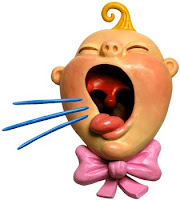
Generally I avoid political topics while posting on our family blog, just like I avoid sports. By and large they're not germane to our daily family life (even though Kate shows signs of becoming a bigger Celtics fan than I am--however sadly that she'll never be able to appreciate fully just how much Kevin Garnett changed this team in 2007. But I digress). But Kate has seen me become, at times, a compulsive reader of political news over the past four months, and be at times short of temper or even lose sleep over the dominant political issue of 2009-2010: reform of American health care. Now, on the night of the House of Representatives' vote to approve the Senate reform bill, I think it's an opportune moment to give my opinion.
I've had my first bouts of ongoing health issues over the past three years, first with a series of cellulitis infections in my leg, which have come and go but never been eradicated. My latest, though mild, outbreak was about three weeks ago. Somewhat more seriously, over the past 18 months I've had some digestive problems which rise from the level of inconvenience to sometimes embarrassment. Mom and Dad both having died from cancer, that class of disease is never far from my mind, but I'm less worried now about that--in 18 months I'd expect more serious symptoms to emerge if I had cancer--than just having some chronic annoyance that will be a constant drain on our family economy.
My problems have been quite mild compared to many folks' around the country. And of course, last year, while Kate was pregnant with Eva, the fact that she was initially single permitted her to receive free care from Rhode Island, even after we married. I believe we pay taxes for civic benefits like that, and I'll always be grateful--foolish though the concept may be concerning a state agency--for the coverage my wife and child-to-be received. As Eva squirms and spits and whines at this instant six feet away from me, with Kate doing everything her ingenuity can devise to quiet the little girl down, ever more reasons for that gratitude are welling up freshly in me.
Though I live a mostly quiet life, and tend to be conservative in my behavior, I'm liberal enough to think of health care in our country as a right. We're one of the most industrialized nations on earth, and the leading economy. We have enough surplus wealth to divert some to taking care of our own. Over the long-term life of a society, I think health care, education and conservation of the environment are the three most important tasks toward preserving and improving society. I won't make the foolish claim that armed forces aren't necessary--they are--but the more resources we divert to them, the less we have for the basic elements of life itself. The military's product--"readiness", in the form of being prepared to fight on a moment's notice--is only occasionally of real use. The rest of the time, "readiness", the effective threat of violence, does nothing but maintain the status quo. In a world full of aggressors (including the US), status quo isn't necessarily bad. But while political status quo is merely maintained, billions of people are still busy leading their lives.
I think a rich nation like the United States has the responsibility to invest in its own population, in order to foster the nation's growth as a whole. Our very Constitution has become a model for almost every government which has followed. The American system of public education--however flawed and now in parts decaying--was a previously unheard-of innovation in the 1800's. Public education laid the foundation for this country's worldwide, amazing display of talent and ingenuity throughout the 19th, 20th and into the 21st century. Public education is nothing more than the public option in educational form. Private schools, at all levels, did and continue to thrive, for those who choose to pay more. The Constitution says nothing about the federal government's right or duty to educate its citizens, but it has become an accepted part of our society that access to basic learning is a fundamental civic good.
I feel that basic public health is no different. In order to promote the welfare of its citizens and of the country as a whole, the federal government has an obligation to guarantee basic health services for every American citizen. There are a whole range of ways to make this actuality. Some (admittedly far smaller) countries, like the Netherlands and Switzerland, have private insurance companies strictly regulated by the central government--much like how our FAA closely monitors private airlines. Others, like France, Canada and England (and, oddly enough, Costa Rica, where Rush Limbaugh said he'd go for care from now on) have nationally-run health plans. We do too--Medicare. I think the passionate reaction over the last nine months of people currently on Medicare, to the prospect of that program being changed or closed down, is fine testimony to its effectiveness and popularity.
I favor a public option in health care. In markets, such as Louisiana where I worked for part of a year and where there is only one dominant health care provider, a federal option would provide some meaningful competition to the private plan. Lack of competition happens to be the exact rallying cry of those opposed to reform. In most markets now, there is no competition. Health care is mostly a set of local or regional monopolies.
Politically (and from my distant, ill-informed vantage point, I lay much of the onus on Obama), a strong public option wasn't viable. The bill we have doesn't do enough to control costs, and is still unduly restrictive on abortion.
A quick tangent on abortion. I believe in a woman's right to choose. For my own part, I could never choose to abort my own child, or ask a woman to do so. When Kate first told me last year that she was pregnant, the thought of aborting the little life that would become Eva never seriously occurred to me. Of course I knew it was a possibility, but not one I would consider. Kate was of identical mind. The fact that we both emphatically chose life for our child, doesn't change my feeling that a woman, at least early in her pregnancy, should have the right to choose whether to carry to term or not. If a woman feels she's not mature enough, or willing, or lacks resources, to raise a child, I do think the more humane course of action is to give her the legal option to abort. The efforts of some lawmakers to kill the entire reform bill unless the right to choose were further limited, disgusted me.
My list of complaints with the bill as it is, is long. There is still no meaningful competition to most private providers. I'm not even sure if the anti-trust exemption for insurance companies--freeing them from much federal oversight--is done away with or not. Much of the subsidy for lower-income plans is borne by the middle class, already disproportionately burdened after the 2003 tax cuts.
But the bill will do three things for the independent (i.e., non-Medicare, non-employer-based) insurance market, which represent a tremendous improvement over the system we know now: first, it will prohibit insurers from denying care to anyone with pre-existing conditions (as Kate's pregnancy was considered--and even my Louisiana Blue Cross would have denied her), and it will prohibit lifetime caps on benefits (helpful to those who actually get very sick, like my mother did); second, it requires everyone to buy insurance (the only way to broaden the risk pool); and third, subsidizes the cost for those who don't have much money.
Those three elements alone constitute tremendous reform. If we can add in effective cost control at some future point in time, and then spread the cost of the subsidies more equitably through society, then I think we'll have a mature, modern health care system.
As it is, I salute the vote being taken right now to reform American health care. I do believe in the better-off among us contributing to help take care of those at a disadvantage. (And though Kate and I have received some help ourselves, on the whole, I consider us to be among the better-off.) I think our country took a large step forward tonight with this vote.
To those who say that Barack Obama's receiving the Nobel Peace Prize was merely affirmative action, I repeat the thought: Barack Obama's being elected President of the United States alone was worthy of a Nobel Peace prize. Consider the legacy of hatred and racism this country has transmitted through the generations since slavery. Consider the horrendous inequality in opportunity, rights and overall treatment between races through the past and still now. Consider the viciousness of the attacks, past and present, upon Obama. Still, by the force of his words and personality, Obama persauded a majority of Americans to vote for him.
Certainly Obama has shown himself to be more centrist than many of his campaign promises. He has also shown the inexperience his critics accused him of. But just as surely, he has engineered a historic change in the American state. Will we eliminate world hunger by 2015, as he promised last year? I doubt it. Will he face continuing opposition to the remainder of his to-do list, including a number of issues dear to progressives like me: climate change legislation; Wall Street reform; immigration reform; and correcting the Supreme Court's handover of the electoral process to corporate interests? Of course. Will I always be happy with Obama's own actions and words, to say nothing of the actual results? Of course not.
But the fact that a half-black man became President, and that same man helped extend basic health care to millions who lacked it, is cause in my heart for tremendous pride in my country. Not to mention, I'll be sleeping a bit easier at nights, with the health of a wife and daughter to care about.
Hope has become somewhat of a dirty word among many in the past year, too charged politically and racially to have a glad meaning. But I will use the words glad, and proud. The United States constitutionally enshrines conservative and progressive elements. The system is conservative enough to make the preservation of the state, and the society surrounding it, possible. The system also provides means for progressive change, that the state may change to more accurately fit its society, as society itself changes, through time. Occasionally, a major progressive change overcomes conservative resistance, and the state is changed irrevocably. Emancipation was one such change. Enfranchisement of women, another. The New Deal, yet another. Enactment of civil rights, still another. And today, March 22--the vote is final as I type this--nearly universal health care is the law of the United States.
So yes, I'm proud of my country, and I'm glad that I live here.




